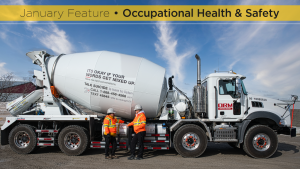The coronavirus pandemic has made working from home the new norm, but for those who are used to working in an office, working remotely can affect mental health.
“Our overall health is made up of the mental, physical and social health and when one of those elements of our health starts to suffer or deteriorate then our overall health deteriorates as well,” explained Kristy Cork, Health and Safety Consultant (Workplace Mental Health), Workplace Safety and Prevention Services (WSPS).
“If social health deteriorates and we don’t have those meaningful connections that maybe we are used to having in the workplace, then it can affect our mental health, physical health and overall wellbeing.”
At least one in five people in Canada has mental health issues, Cork pointed out.
“It is important if you are a manager and you do have workers, that you pay particular attention and check in a little more often with workers you know struggle with mental health at the best of times, they likely are really struggling now,” said Cork.
“For everybody else…I think it’s important to take a look and see how they are dealing with this stress. We all cope and deal with stress in different ways.”
She suggests creating a routine with some structure can be helpful for a lot of people.
You can’t have the same expectations if you don’t have the same tools,
— Kristy Cork
Workplace Safety and Prevention Services
“It’s important even if you are working from home to get up and get changed in the morning, have a shower, have breakfast, do those things that you normally would do before going into work,” Cork noted. “Do take breaks, do have lunch, have a time where you are checking in with other people and spending time with your family if they are home with you.”
Managers may potentially need to redefine what success looks like and adjust expectations and discuss that with each employee.
“It’s important people understand what they need to do working from home to be successful and don’t set yourself up for unrealistic expectations,” said Cork. “You can’t have the same expectations if you don’t have the same tools.”
“People that are unfamiliar with working from home may feel like they can’t focus or are easily distracted,” added Cork. “This is normal and people should be kind and forgiving to themselves. It’s OK to not be quite as productive or need extra breaks.
Managers may also struggle with their mental health, she said, adding it may be a good time to work on building resiliency for themselves and their team.
For employers who are new to the idea of having employees work remotely, resist the urge to micro-manage, Cork stated.
“Managers can demonstrate care and concern to their team members by checking in on workload, offering support, making sure they have the tools and resources to be successful from home,” she said.
“Have regular check in meetings set up in advance so the employee knows to expect a call but to constantly call to micromanage or check-in is not helpful for anybody and resisting the urge to do that is important… It may be a struggle to not know what your employees are doing all the time, but trust that they are working in a way that will still get the job done, while taking care of themselves and their loved ones.”
Cork also suggested the term social isolation should be referred to as physical isolation instead.
“It is a physical isolation but we still want people to remain social whether it’s through social media or picking up the phone and talking to people, Skype meetings, whatever that looks like. We don’t really like the term social isolation or distancing, it’s physical distancing and isolation but you can absolutely still remain social.”
In terms of resources, Cork recommends The Canadian Mental Health Association, 211 and Thinkmentalhealth.ca. WSPS.ca also offers free courses on workplace safety and health through Canadian Centre for Occupational Health and Safety.
Paul Radkowski, CEO, Life Recovery Program, said there are four evidence-based best practices for organizations and business leaders especially now, given the stress COVID-19 has created.
“Communication, care, consistency and credibility are the foundations of a good leader and for any healthy relationship regardless of one’s rank or position,” said Radkowski in an article posted on LinkedIn.
Read the full the LinkedIn article here.
Follow the author on Twitter @DCN_Angela.







Recent Comments
comments for this post are closed